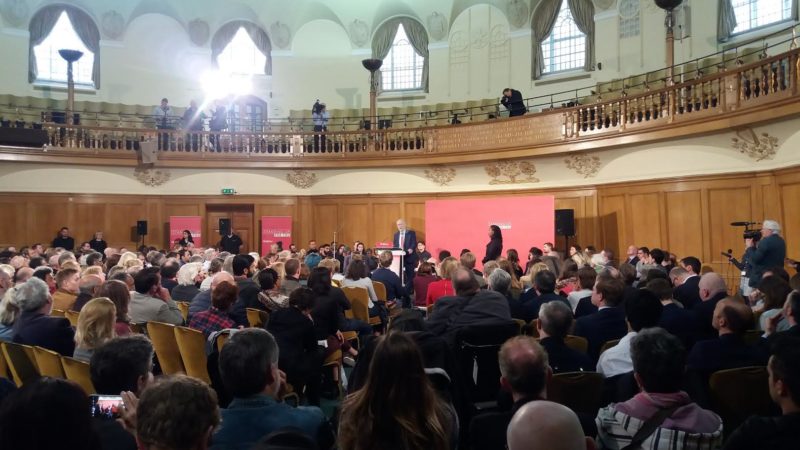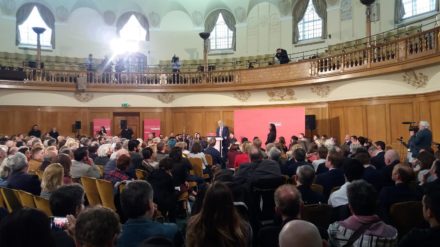

On Sunday, Corbyn’s Labour Party could receive an unexpected boost. If Jean-Luc Mélenchon qualifies at the first round of the French presidential election, Labour’s policies could reach another level of recognition and visibility.
For instance, free school meals and the increase in the minimum wage pledged by Corbyn are also part of the programme of France insoumise (French Unbowed), the movement (not a party) headed by Mélenchon. And this movement has been catching like wildfire.
Nearly half a million supporters are likely to have registered online by election day as 3,000 support groups have mushroomed in France and abroad, working overtime to broaden the appeal of what is now called a “citizens’ revolution”.
According to polls, while the four candidates heading the race have similar numbers of intended voters, Mélenchon is the only one whose share is still rising. And as over a third of the population is still undecided, the outcome is unpredictable.
The two candidates with most votes on April 23 will face a second round on May 7.
The programme of France insoumise includes: grants for students, 90 per cent taxation on high earners and hunting tax-evaders, return to a 35 hours a week (32 in some sectors), pay equality for women, pension at 60, an end to homelessness and poverty affecting nine million people, free healthcare and a disability benefit equivalent to the minimum wage, regularisation of all working illegal immigrants, no quotas for refugees.
Many of these policies are similar to Corbyn’s 10 pledges; some go further: school meals must be organic and energy 100 per cent renewable. The central policy on the environment is also an anti-war strategy: “…renewable energies would free us from the tyranny of fuel energy and its wars for oil”.
In Rennes, at one of the many meetings he addressed, Mélenchon described the situation of women who are 80 per cent of minimum wage earners, work mostly in the service sector while increasingly having to care for children and the elderly for free.
“Women are the ones who trigger revolutions,” he said. “They were the first to break down the system in the 1917 revolution and the ones who carried through the 1789 revolution by marching to Versailles to get the king.”
In Marseille, addressing 70,000 people at an open air meeting, he asked for a minute’s silence in memory of the 30,000 refugees who have lost their lives in the Mediterranean. He spoke of a mixed-race peace-loving France for all and of a “caring protectionism” where agreements between countries are based on co-operation not an unregulated free market. In Toulouse, he condemned the $1m bomb Trump dropped on Afghanistan: “This money should have been used to feed children and pay for teachers in Afghanistan.”
For those of us in Payday who support the Global Women’s Strike perspective to invest in caring not killing, and to pay a living wage to all workers, including mothers and other carers, this is a hopeful and exciting programme.
What really distinguishes France Insoumise, however, is the pledge to organise a constituent assembly to draft a new constitution to end “the monarchy of the presidential system and the political caste” and extend “the power of the people” in decision-making. “Our programme L’avenir en commun (A shared future) is the real candidate at this election,” says Mélenchon.
In “They must all go” – a book and a slogan aimed at “the oligarchy” – Mélenchon shows how in Venezuela and other Latin American countries the grassroots re-engaged in active politics through the process of creating a new constitution.
An anti-war and anti-austerity programme means more independence for France: withdrawal from Nato, the IMF and the World Bank, and radical changes to the EU treaties (including opposing austerity budgets and privatisation of public services) or France would leave the EU to develop new co-operations, notably with countries around the Mediterranean . Negotiations with the UK on leaving the EU should be done “without vengeance or punishment.”
An indication of Mélenchon’s success is the scaremongering he is facing from the established media. Natalie Nougayrède, a supporter of the centrist Emmanuel Macron, wrote in The Guardian: “A choice between Le Pen and Mélenchon in the presidential run-off would likely lead to record low turnout and unprecedented gains for the far right.”
Why? Many in the US warned that Bernie Sanders stood a better chance of defeating Trump than Hilary Clinton did. But the establishment, and its media, backed Clinton. Result: Trump; the biggest non-nuclear bomb dropped on Afghanistan and a standoff with North Korea.
Will the media moguls now ensure a Le Pen win in France? Their favourite, financial banker Emmanuel Macron supports the very austerity measures that have led so many towards the Front National. Mélenchon, on the other hand, is “even stealing votes from Le Pen”. How about supporting the best anti-fascist candidate?
The movement and the demands of France insoumise have the potential to advance the Corbyn campaign in the UK. While there are many differences, both Mélenchon and Corbyn are anti-establishment, anti-racist, anti-war, anti-imperialist candidates. They represent a unique opportunity to win power with principles.
Information and support by anyone at www.jlm2017.fr. French people living abroad can vote at their embassy or consulate.
Benoit Martin is an activist in Payday men’s network working with the Global Women’s Strike.




More from LabourList
‘Tackling poverty should be the legacy of Keir Starmer’s government’
‘The High Court judgment brings more uncertainty for the trans community’
‘There are good and bad businesses. Labour needs to be able to explain the difference’